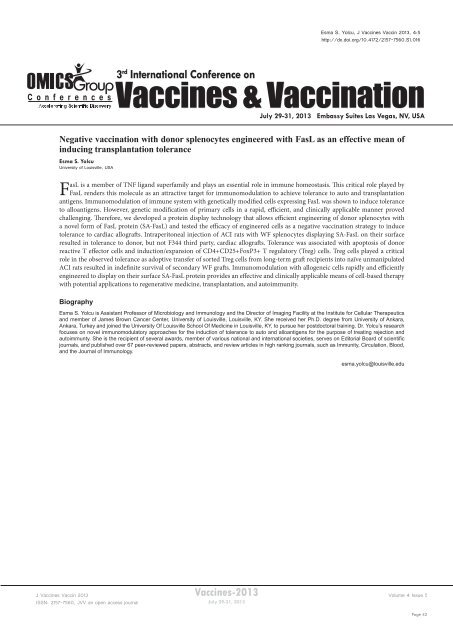Vaccines-2013 - OMICS Group
Vaccines-2013 - OMICS Group
Vaccines-2013 - OMICS Group
Create successful ePaper yourself
Turn your PDF publications into a flip-book with our unique Google optimized e-Paper software.
Esma S. Yolcu, J <strong>Vaccines</strong> Vaccin <strong>2013</strong>, 4:5http://dx.doi.org/10.4172/2157-7560.S1.0163 rd International Conference on<strong>Vaccines</strong> & VaccinationJuly 29-31, <strong>2013</strong> Embassy Suites Las Vegas, NV, USANegative vaccination with donor splenocytes engineered with FasL as an effective mean ofinducing transplantation toleranceEsma S. YolcuUniversity of Louisville, USAFasL is a member of TNF ligand superfamily and plays an essential role in immune homeostasis. This critical role played byFasL renders this molecule as an attractive target for immunomodulation to achieve tolerance to auto and transplantationantigens. Immunomodulation of immune system with genetically modified cells expressing FasL was shown to induce toleranceto alloantigens. However, genetic modification of primary cells in a rapid, efficient, and clinically applicable manner provedchallenging. Therefore, we developed a protein display technology that allows efficient engineering of donor splenocytes witha novel form of FasL protein (SA-FasL) and tested the efficacy of engineered cells as a negative vaccination strategy to inducetolerance to cardiac allografts. Intraperitoneal injection of ACI rats with WF splenocytes displaying SA-FasL on their surfaceresulted in tolerance to donor, but not F344 third party, cardiac allografts. Tolerance was associated with apoptosis of donorreactive T effector cells and induction/expansion of CD4+CD25+FoxP3+ T regulatory (Treg) cells. Treg cells played a criticalrole in the observed tolerance as adoptive transfer of sorted Treg cells from long-term graft recipients into naïve unmanipulatedACI rats resulted in indefinite survival of secondary WF grafts. Immunomodulation with allogeneic cells rapidly and efficientlyengineered to display on their surface SA-FasL protein provides an effective and clinically applicable means of cell-based therapywith potential applications to regenerative medicine, transplantation, and autoimmunity.BiographyEsma S. Yolcu is Assistant Professor of Microbiology and Immunology and the Director of Imaging Facility at the Institute for Cellular Therapeuticsand member of James Brown Cancer Center, University of Louisville, Louisville, KY. She received her Ph.D. degree from University of Ankara,Ankara, Turkey and joined the University Of Louisville School Of Medicine in Louisville, KY, to pursue her postdoctoral training. Dr. Yolcu’s researchfocuses on novel immunomodulatory approaches for the induction of tolerance to auto and alloantigens for the purpose of treating rejection andautoimmunty. She is the recipient of several awards, member of various national and international societies, serves on Editorial Board of scientifi cjournals, and published over 67 peer-reviewed papers, abstracts, and review articles in high ranking journals, such as Immunity, Circulation, Blood,and the Journal of Immunology.esma.yolcu@louisville.eduJ <strong>Vaccines</strong> Vaccin <strong>2013</strong>ISSN: 2157-7560, JVV an open access journal<strong>Vaccines</strong>-<strong>2013</strong>July 29-31, <strong>2013</strong>Volume 4 Issue 5Page 42


